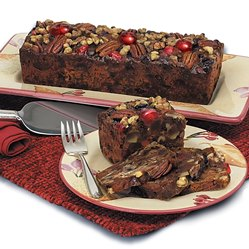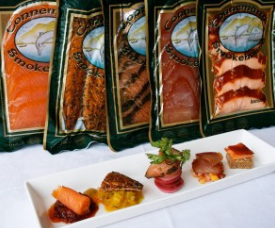The Hills are Alive with the Smell of Chocolate…
AS WE wake up this Easter Sunday morning, the hills may not be alive with the sound of music, but at Kylemore Abbey in Letterfrack, Co Galway, the kitchens are alive with the sound of industry – and the aroma of chocolate.
The Benedictine nuns are now making chocolate for sale under the Kylemore Abbey label. There is nothing new in monastic orders producing high-end foods and spirits to barter and sell – they have been doing it for over 1500 years. You only have to think of the eponymous Benedictine liqueur, and the Belgian dark beer Westvleteren 12 sold by the monks of the St Sixtus Abbey at their abbey.
 There’s even a website – www.monasterygreetings.com – which sells all sorts of goodies from almost 100 monasteries worldwide. The ‘all time bestseller’ apparently is the 2lb rum fruitcake produced by Trappist monks, the recipe for which was provided by a chef who was employed apparently by the Duke and Duchess of Windsor.
There’s even a website – www.monasterygreetings.com – which sells all sorts of goodies from almost 100 monasteries worldwide. The ‘all time bestseller’ apparently is the 2lb rum fruitcake produced by Trappist monks, the recipe for which was provided by a chef who was employed apparently by the Duke and Duchess of Windsor.
The Benedictine nuns came to Kylemore Abbey from Ypres in Belgium after the First World War. These ‘Irish Dames of Ypres’ have always had a tradition of education, particularly that of the daughters of the nobility. Maintaining that tradition in Ireland, Kylemore Abbey was a school for many years but, with declining student numbers, it had to close in 2010.
The industrious nuns, with amazing business acumen and foresight, had already turned to tourism by developing their main asset – Kylemore Abbey itself and its six-acre Victorian walled garden which was restored and reopened in 1999. This has proved a major attraction. There is also a very large attractive eatery, Mitchell’s cafe, where no doubt many will be enjoying Easter Sunday lunch before browsing the extensive shopping facilities.
I recently met Sr Magdalene and Sr Genevieve who told me of the community’s chocolate making and further plans for development.
“When the abbey is restored – because it’s a big, big programme we have a restoration programme as well as a new monastery – eventually in that development plan we probably will have a cookery school in the kitchen in the abbey, something like that.
“The community is growing a little at the moment: we already have two new members. One is Irish but has come from a German monastery, the other Sister is already a fully fledged Benedictine. She is a mathematician and you never know what she will do for us!” said Sr Magdalene.
 Sr Genevieve explained the practicalities of their chocolate endeavours. “Things can get out of hand if you take your eye off it, the thermometers trip up and then you have ruined your chocolate. Most of the time we get it right.
Sr Genevieve explained the practicalities of their chocolate endeavours. “Things can get out of hand if you take your eye off it, the thermometers trip up and then you have ruined your chocolate. Most of the time we get it right.
“We have up until now been making bars and small chocolates without any particular ganaches but now we have become more sophisticated, doing marshmallows and honeycomb, pralines and jellies. And there is summer chocolate and winter chocolate. Everything is much colder in winter and it is quite a challenge to make nice chocolate, but we thaw out in summer and everything is so much simpler – the living is easier.
“The recipes depend on the chocolate you get, and the better the chocolate, of course. The tempering is something of an art form that has been perfected over decades.
“The whole history of chocolate is a most fascinating one. It was, of course, the Mayans in South America… it was then taken up by the Spanish and was confined to Spanish royalty and the nobility for hundreds of years.”
Four of the nuns are involved in the chocolate production. Sr Genevieve explained, “Someone cuts up labels, someone ties it up, someone washes up, and someone tempers the chocolate. Packaging is very expensive. I tried at the beginning, with the best of intentions, to keep the packaging as simple, cost effective and all the rest of it, but then I was told no, they’ve got to be gift wrapped.
“It’s all very hands-on, labour-intensive. We do four hours in the morning from 8am to 12 noon and then we break for Mass and lunch. Then a couple of us come back in the afternoon.
“All religious monastic orders, Benedictines especially, always specialise in high-end products that are labour- intensive and good quality. We make soaps also.”
The Australian-born nun continued, “We are building a church, and the abbey is hugely expensive to maintain, it never stops. It reminds me of Sydney Harbour Bridge – they paint it, and as soon as they finish it they have to start again.”
 Further west at Bunowen Pier, Graham and Saoirse Roberts run the Connemara Smokehouse, one of the best smokehouses in the country. They are a charming and enthusiastic couple who work very hard in carrying on the tradition of producing smoked salmon which was started by Graham’s parents in 1979.
Further west at Bunowen Pier, Graham and Saoirse Roberts run the Connemara Smokehouse, one of the best smokehouses in the country. They are a charming and enthusiastic couple who work very hard in carrying on the tradition of producing smoked salmon which was started by Graham’s parents in 1979.
“We do traditional smoked salmon and also smoked tuna which is very popular. It is line caught and environmentally friendly,” said Graham.
They also do smoked mackerel, plain or peppered, as well as gravad lax, and roast and honey roast hot smoked salmon. Another product is a smoked tuna mousse from Graham’s grandmother’s recipe which he has “tweaked a bit”. It involves cream so has a short shelf life and is only available at the smokehouse.
Eight people work at the Connemara Smokehouse. “They have young families, so that’s 30 people benefiting in a positive way by what we are doing. Nobody’s ever going to be wealthy doing what we do, but you can make a living doing something you enjoy in the long term.
“Ten years ago people had lost the run of themselves, which thank God was never the way I was brought up. My two older boys come down to the smokehouse during the summer, and my daughter helps out in the shop. They learn that if they want pocket money they have to do something for it, but again it’s a nice gentle way of bringing them into it without saying ‘it’s a family business you have to work in it’, it’s their choice. That’s how it was for me as well and it’s something that I’ve always loved doing,” Graham explained.
At the landmark Joyce’s Craft Shop at Recess, we met the very artistic Mark Joyce who was just reopening the business after winter closure. This is a big place with a huge array of crafts and art work, with many works by Mark himself including the massive sculpture of The Connemara Giant facing the shop.
“I bought the business from my parents a dozen or so years back. We are just open now after the winter. Tourists are beginning to come back, it dropped off about five years ago,” Mark explained.
“Business really dies in the winter so I close for four months. It is amazing to think that a business can handle closing down for four months; the whole West of Ireland shuts down and opens around St Patrick’s Day.”
Look out for Mark’s fabulous scenic painting on unprimed canvas with cottages having 18ct gold roofs, as well as his brilliant contemporary Paul Henry-style posters entitled ‘Connemara State of Mind’ and ‘Republic of Connaught’.
